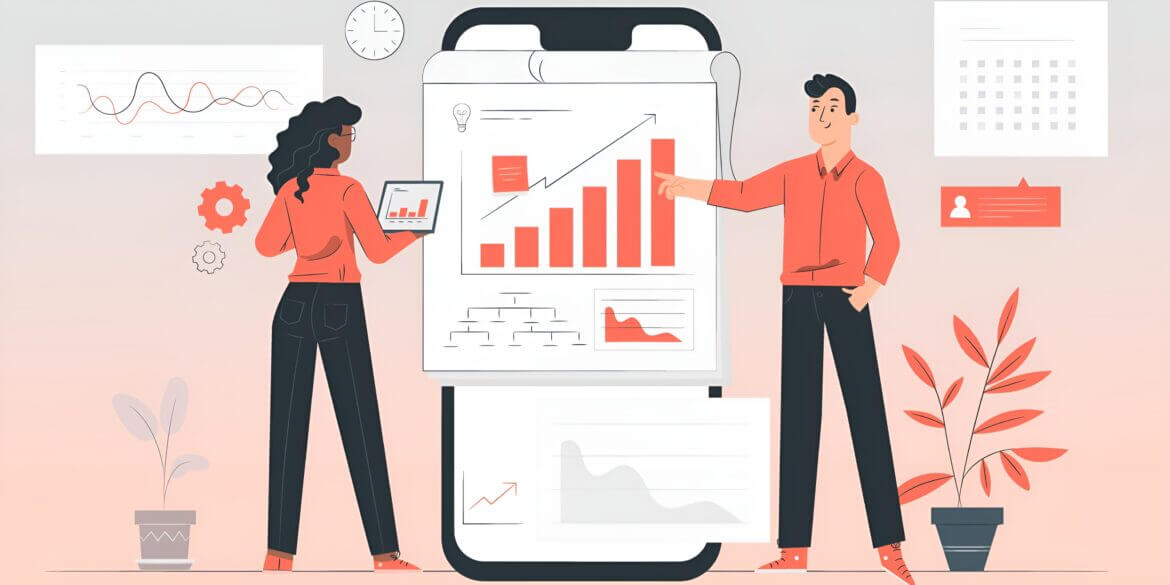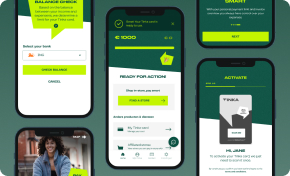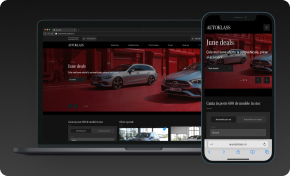Apps’ future success is conditioned by scaling. We will teach you how to build scalable apps that boost growth. Scalability means the possibility of adapting to meet greater needs in the future, according to the Oxford Dictionary.
To explain scalability a little bit more, let’s assume that your product is used by 10,000 people today. When you ask yourself if the same product can be used by 100,000 people tomorrow, you are thinking about scalability. So basically you are asking if scaling this product determines more people that can effectively use it.
Begin Your Digital Transformation Journey
Customized Strategies to Lead Your Business into the Digital Age
Explore Digital TransformationIf you want to know how scalability applies to apps, let’s find out together how it works and what we need to do to improve the scalability of software applications.
What Does Scalability Mean for Apps?
In the app development industry, scalability describes the app’s ability to handle a growing number of users. The app’s scalability ensures successfully sustaining the growth of its user base over time. If the app is built and configured properly by the developers, scalability is achieved. They will align the right hardware and software protocols and hardware in order to meet a large number of requests each minute.
Building a scalable application will always be important for its success. Good user experience, growth accommodation, and better ROI are influenced by scalable apps.
A really scalable app should be able to provide:
- Efficiency at every step, even at high loads
- Fast service with speed uninfluenced by the number of users
- Ability to evolve while the number of users grows
App scaling types
The 2 main types of scaling apps:
Experience the Power of Professional Web Development
Transformative Web Solutions Designed for Your Business Growth
Discover Web Development- Horizontal scaling means more servers or machines are added with the app code, enabling the capacity expansion
- Vertical scaling means more resources such as CPU, memory, or network capacity are added to allow the app to handle a high number of simultaneous requests, with less to no effort. The downside of vertical scaling is the dependency on existing servers and a limited capacity to scale
Scaling Apps Brings Lots of Benefits
Improving user experience
The primary benefit of app scaling is a seamless experience provided for any number of users at any moment. At this speed, app functions have a great influence on the UX and can be decisive for your app. Google researches show that over 50% of users leave a mobile app or website that loads in more than 3 seconds. And their tendency of coming back rarely occurs, so scalability is key to keeping your users engaged and happy.
App leveraging during high traffic
When you build a scalable app, you’ll be leveraging it during high-traffic periods like festive occasions or holidays, when the use and traffic of the app are expected to increase. Special promotions can be offered during these periods and leads can turn into customers willing to pay, as they won’t be experiencing bugs or problems caused by higher traffic.
Post-launch maintenance helps you save money
If you ever wondered how to improve a web or mobile app’s scalability, you need to know that the things done in the beginning are the most important. Even though creating a scalable app from the beginning might cost you a little bit more, it’s worth it in the long term, because the hours you would have spent fixing the app and adapting it to higher traffic will be gone. If you want to have less work to do for the app in the future, invest more effort and resources in the app from the start.
Redefine Your IT Strategy with Our Consultancy
Customized Solutions for Optimal Performance
Discover IT ConsultingBetter user feedback
One of the most essential things in successfully developing apps is user feedback. If you receive more positive reviews, more people will start to use your app. Make it functional and high-performing if you want to achieve this, with the minimum disruptive bugs possible. Prioritizing scalability will surely make the app work well every time, facilitating easier growth of your user base.
Profit margins growth
If more people download your app, more money will come out of it. More downloads often come with reviews and recommendations, so if the app has no bugs and performs seamlessly, it’s likely that the feedback and the profit will be at your desired level. Invest in scaling your app from the start to determine boosting your revenue. Scaling the app later in the development process might attract higher costs.
How to Improve the Scalability of an App
Look for these things that make an app scalable:
- Performance: When you’re aware of the app’s capacity, it helps you determine the point of saturation when the app could show some issues. Take into consideration the app’s capacity to handle an increase in users.
- Recoverability: Experiencing a failure is followed by the time needed to restore the app to its original working state, so make sure this happens fast. It will help you prevent losing money and users, and it’s an important aspect of building an app.
- Ease of management: Easy to maintain & update your app, because really scalable apps don’t experience issues with updates and maintenance.
Scale quickly by setting your app
If you understand your app very well, you’ll be able to scale it quickly. Being aware of its infrastructure and of the resources that might cause performance problems will help you highlight the best scaling areas.
Aim for a deeper scaling plan while choosing horizontal, hybrid, or vertical scaling as the most viable option. Test your app during the scaling process to understand what latency may come from increasing loads.
Avoid scaling your app on physical servers and choose cloud-based servers and hosting from the beginning, if you want to do things efficiently. Of course, that simplicity is key, so simple apps are easier to scale. If you opt for a complex app, it will be harder to scale quickly and it can cause lots of problems.
Use caching, always!
Consider caching first if you want to improve the app’s scalability. Saving ready-made results deliverable to a user without processing more data is basically caching. You will experience a better overall user experience, as the requests are met faster.
Decreasing the load put on your system’s resources is determined by caching because this way you’ll avoid downtime, delays, and other issues that might come from the system overload.
Users don’t like waiting to get what they need, so a high-performing app is tied closely to user retention.
Use CDNs to your advantage
The CDN is a Content Delivery Network, able to help in scaling apps by increasing the speed of content delivery to the users. By using multiple servers scattered around the world, CDNs make this possible, while access to these servers decreases the app’s response time, this way creating a positive user experience.
For apps meant to be used globally, CDNs are a good option. But this solution won’t be just as practical or efficient for local apps.
Libraries designed for performance are best
Using high-performance libraries from the beginning helps you build a scalable app. By using JavaScript instead of load dash determines a faster app that’s more efficient. While choosing packages & libraries, focus on their software scalability and performance rather than their popularity.
Choose the proper framework
A huge impact on the scalability of your software application comes from the technology you use, so before beginning the development process, do a research on the types of development technologies able to give you the best potential for the app’s scaling and avoid the ones that give you a low scaling potential. Angular and Node.js are popular for their high scaling potential infused in the apps built with these technologies.
Choose the proper host
Server configuration and infrastructure are very important as well, it’s not just about the code when it comes to scalability. By choosing the proper providers and tools you’ll save a lot of time and energy.
Custom Software Perfectly Aligned with Your Strategic Objectives
Software Solutions that Fit and Enhance Your Business Strategy
Explore Custom SoftwareBuild a clean code
Clean code is perhaps the most common thing when it comes to scalable apps. Complicated and mixed code become too difficult to manage in the end, so scalability is much harder to achieve. We advise you to keep your code clean as you can avoid mixing many parts of your code into just one place.
Keep the front-end and back-end layers separate while scaling apps, use design patterns wisely and detach the background jobs from the main system.
Key Ideas
Wanting to achieve commercial success means building a scalable app and to succeed, always remember to be careful about the framework you use, choose your hosting wisely, keep your front-end and back-end layers separate and keep the code clean.
By following our advice, you’ll soon be able to build a truly scalable app, while saving time and money, improving user experience and handling high-traffic periods. This is the right path that leads to increased profit.
So what will you choose to use to make your app scalable?
Contact us to find out more about what we do and how we can help you!










